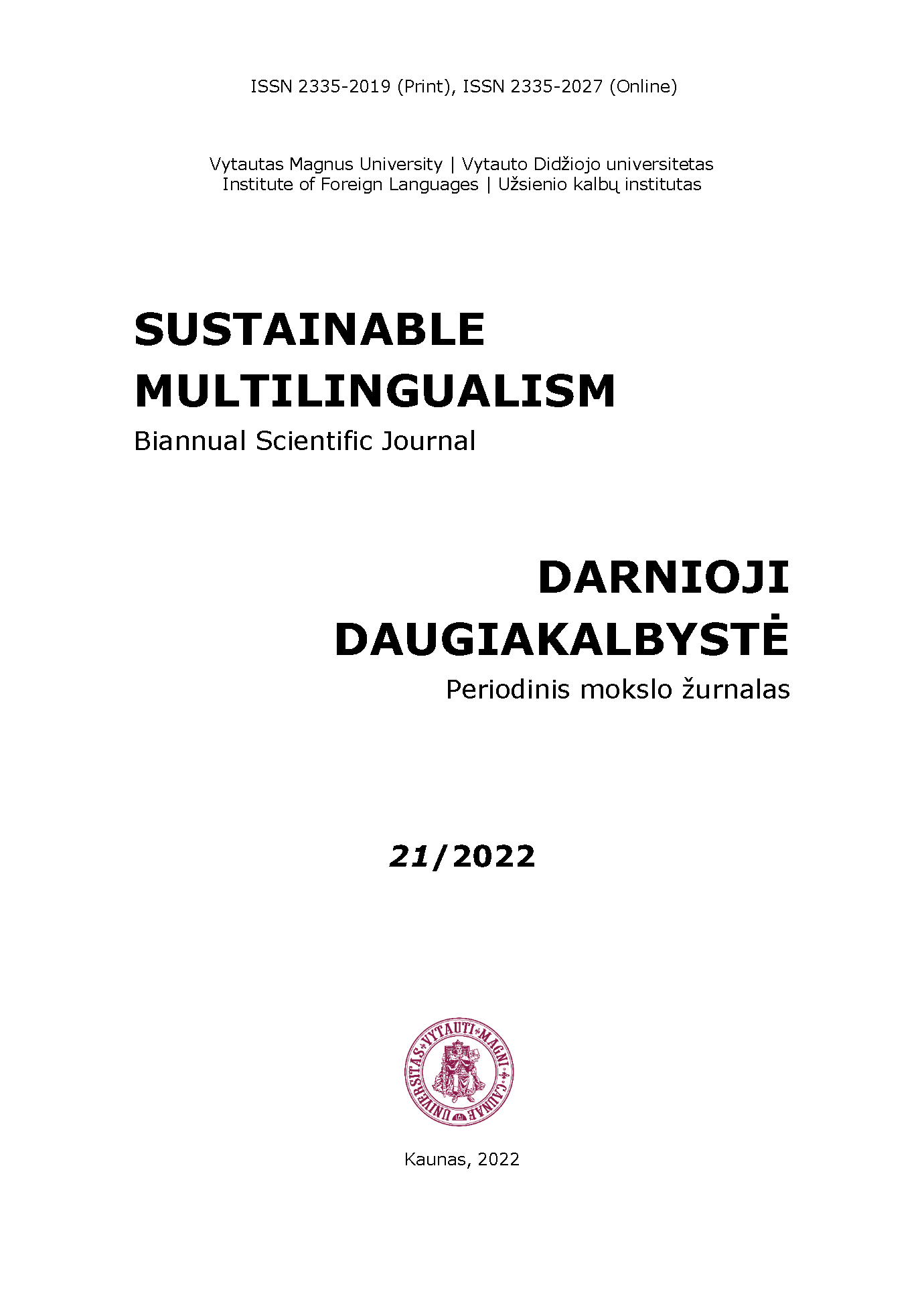Studentu lingvistiskā attieksme pret kļūdām svešvalodu apguvē un lietojumā
Students’ Linguistic Attitude Towards Language Mistakes/Errors in Learning and Using a Foreign Language
Author(s): Diāna Laiveniece, Linda LauzeSubject(s): Language and Literature Studies, Foreign languages learning
Published by: Vytauto Didžiojo Universitetas
Keywords: Causes of mistakes/errors; Error prevention; Foreign language acquisition; Use of a foreign language; Language mistakes; Language errors; Linguistic attitude; Students;
Summary/Abstract: As the intensity of communication increases, the number of language mistakes/errors increases. Nowadays, the acquisition and use of a foreign language often takes place in parallel, and language mistakes/errors are a natural part of this process but this does not mean that they must be tolerated. The study is based on the results of a sociolinguistic survey obtained in 2018 and 2019. 253 students of four Universities and specialties, as well as different study levels from Liepāja, Ventspils and Rīga participated in the survey anonymously. Most of the respondents indicated that Latvian was their mother tongue; for a small number of participants, it was a second language or a foreign language. The surveyed students also differed in the type and number of foreign languages acquired. The present paper is the second part of a wider study (see the results of the first stage of the research by Laiveniece and Lauze, 2020). The aim of this paper is to characterize students’ linguistic attitude towards language errors in learning and using a foreign language: how to evaluate errors, whether errors are generally permissible, what affects them, and how to eliminate them. In the course of the research, an assumption emerged: the more foreign languages are learned, the more tolerant the linguistic attitude is towards mistakes/errors that are made when speaking a foreign language. However, the analysis of the questionnaire findings did not confirm this. Most of the respondents attributed errors to the language learning process. Whether or not errors were made when speaking a foreign language was determined by the situation and purpose of the communication, as well as the level of language acquisition. / Intensyvėjant komunikacijai, auga kalbos klaidų skaičius. Mūsų laikais užsienio kalbų mokymasis ir vartojimas dažnai vyksta paraleliai, tad kalbos klaidos yra natūrali šio proceso dalis, tačiau tai nereiškia, kad su jomis reikia susitaikyti. Tyrimo pagrindą sudaro sociolingvistinė apklausa, vykdyta 2018 ir 2019 m., kurioje anonimiškai dalyvavo 253 įvairių tautybių ir specialybių bei skirtingų studijų pakopų studentai, besimokantys keturiose Latvijos aukštosiose mokyklose (Liepojoje, Ventspilyje ir Rygoje). Didžioji dalis respondentų nurodė, jog latvių kalba jiems yra gimtoji, kitiems ‒ tai antroji arba užsienio kalba. Apklaustieji studentai skiriasi ir pagal užsienio kalbų mokymosi būdą ir pagal pačių kalbų kiekį. Straipsnyje pristatomas tyrimo tęsinys (pirmojo etapo rezultatus pristatė Laiveniece ir Lauze, 2020), jo tikslas ‒ apibūdinti lingvistinį studentų požiūrį į klaidas, daromas mokantis užsienio kalbų ir jas vartojant. Svarstomi šie klausimai: kaip vertinti klaidas, ar klaidos apskritai leistinos, kas jas sukelia ir kaip jų išvengti. Tyrimo metu buvo iškelta hipotezė: kuo daugiau užsienio kalbų išmokstama, tuo lingvistinis požiūris į klaidas, daromas kalbant užsienio kalba, yra tolerantiškesnis. Vis dėlto apklausos medžiagos analizė keltos hipotezės nepatvirtino. Didelė dalis respondentų klaidų darymą sieja su kalbos mokymosi procesu. Tai, ar kalbant užsienio kalba yra ar nėra toleruotinos klaidos, lemia bendravimo situacija ir tikslas, kuriuos kalbos vartotojas dažniausiai geba skirti. Tačiau tam, ar kalbėtojui pavyksta pasiekti bendravimo situaciją ir tikslą atitinkančią kalbėjimo kokybę, didžiausią įtaką daro kalbos mokėjimo lygis.
Journal: Darnioji daugiakalbystė
- Issue Year: 2022
- Issue No: 21
- Page Range: 227-248
- Page Count: 22
- Language: Latvian

